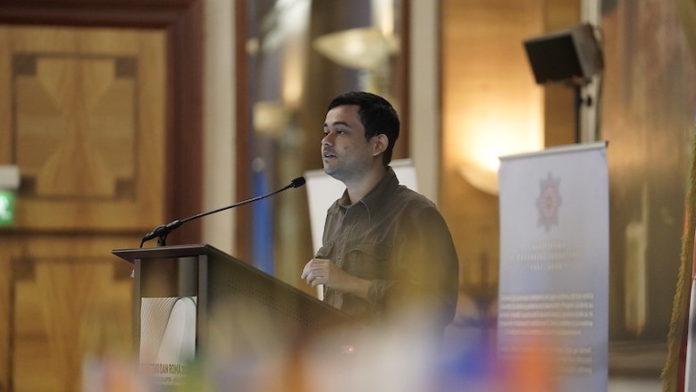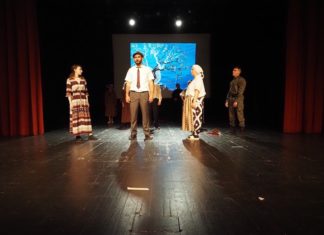Avishek Ray from the National Institute of Technology in Silchar, India, presented at the international conference “Roma as the Indian Diaspora – Unbreakable Ties” on the topic: Heuristics and Epistema in Roma Histography: A Review of Genealogical Fantasy. His work focuses on how scholars and experts have sought to understand the Roma population, and how, throughout history, radical changes in scientific approaches – from Orientalism to Postorientalism, from Structuralism to Poststructuralism and from Colonial to Postcolonial Theory – have affected the way these experts approach the Roma as a “subject of study”.
How would you describe the change in the perception of scientists’ approach to the Roma community as an “object of study”? How has this affected their tendency to declare their theories of “Indian descent” scientific?
The search for the ‘origin’ of the Romani, based on a structural analysis of the Romani language, started as early as the eighteenth century; and the premise of the claim, in most instances, rests on the ‘family resemblance’ – sometimes rather flimsy – between Romani and certain Indic languages. I call this ‘flimsy’ because several scholars before me have pointed to the ‘loose ends’ in the linguistic research furnished so far. I’m not discounting the linguistic research; I mean it’s inconclusive. Later on, scholars would engage in serological research; and finally, genetic research. Broadly speaking, we have had three strands of research: linguistic, serological, and genetic; and each would strive to present itself as more ‘scientific’ (and therefore, more conclusive) than the preceding research trend. The principal difficulty, in this regard, is that the Roma migration happened in the past, and therefore can no longer be studied in itself. At best, scholars can make inferences based on empirical facts. These inferences lead to theories. Theories, in themselves, are neither true nor false; they are meant to explain things. What I show in my research is that the problem is not so much with the ‘Indian origin’ theory as with the pervasive tendency, in some academic quarters, to pass it as ‘scientific’ truth.
In your presentation, you stated that folklore was an integral part of research on the Roma, ie that it was initially left to amateur folklorists. On what basis did they base their claims, when it comes to folklore, about the Indian origin of the Roma?
This is actually Judith Okley’s observation. Drawing on her, I demonstrated how scholarly interests in the Roma (that is, Gypsology as a discipline) and folklore were gaining traction almost simultaneously in the late nineteenth century. If you look into the early publications on Roma (at that point, referred to as ‘Gypsies’), you’ll realize, as I said, folklore was an integral part of knowledge production on the Roma. The folklorists, as one understands, were predisposed to studying the ‘distant Other’. This attitude is reflected in their study of the Roma. I’m not sure if the folklorists made any claims on the Indian origin – rather, the philologists would make this claim. What I meant is that the disciplinary bias of folklore – precisely, its tendency to exoticize the Other – reflected on the folklorists’ study of the Roma.
How do you comment on the efforts of the European Roma community to be recognized as an Indian diaspora? Is it talked about in the Indian media, in the academic and scientific community? What is the perspective of the Indian community on this?
I wonder if the entire European Roma community makes such an effort. I understand that many among the Roma don’t have any ‘homeland’ orientation, and therefore, it wouldn’t be correct to make any generalization. Having said that, I completely understand the significance of this recognition for the Roma, at least for those who seek it. As for the Indian response, we all know that the Roma were much discussed, and their efforts to be recognized as an Indian diaspora were reciprocated, during the Indira Gandhi regime, thanks to the effort of the Indian diplomat Veer Rajendra Rishi. Unfortunately, after the demise of Gandhi and Rishi, the dialogue stalled. The once-vibrant Indian Institute of Romani Studies in Chandigarh is now defunct. I hear its collections – materials that warrant archiving – are now in a dilapidated state. The current Indian government, for all intents and purposes, wants to reclaim the Roma. But, this, the critics say, is not free of problems. The Wire recently did an article on this.
The participants in the conference adopted a Declaration calling for the recognition of the Roma as the diaspora of the Republic of India and in that sense the establishment of lasting and meaningful relations in all areas of social life and activity. How do you comment on the significance of that Declaration?
I’ll be rather frank here. I read the Declaration in detail. I find that it’s drafted in a very evocative (rather than diplomatic) language. For example, it cites India as the Roma’s ‘cultural birthplace’. It is meant to be read as a manifesto, in the spirit of political rhetoric; rather than an administrative-political document. It has a charge of its own. I don’t mean to be cynical, but I have certain anxiety that I must share. Much as I am convinced that those who drafted the Declaration and are spearheading this initiative are, in their intent, well-meaning; however, I wonder if they are aware of how the current Indian government, as critics fear, may ‘repurpose’ this.












